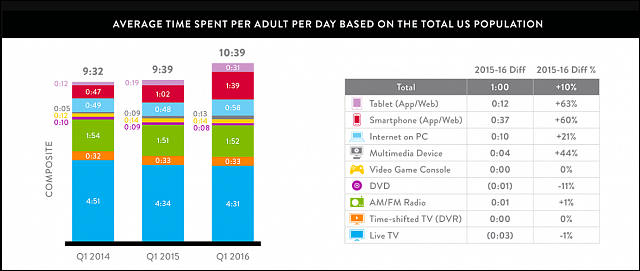
It allows to keep PV going, with more focus towards AI, but keeping be one of the few truly independent places.
-
Illustration:
Beyoncé made the surprise announcement that she was pregnant with twins, via a Renaissance art-esque Instagram post. Unsurprisingly, the post rode the wave of internet excitement for hours, and now, with around 6,308,000 likes and climbing rapidly, it has become the most-liked post on Instagram to date.
-
Perceived social isolation (PSI) is associated with substantial morbidity and mortality. Social media platforms, commonly used by young adults, may offer an opportunity to ameliorate social isolation. This study assessed associations between social media use (SMU) and PSI among U.S. young adults.
Young adults with high SMU seem to feel more socially isolated than their counterparts with lower SMU. Future research should focus on determining directionality and elucidating reasons for these associations.
http://www.ajpmonline.org/article/S0749-3797(17)30016-8/abstract
-
Nothing like a graph with zero context info or source attribution to inspire confidence...
-
Nothing like strange comment inspires me :-)
http://anepigone.blogspot.com/2017/04/average-iq-of-college-graduates-by.html
You really do not need any context here except the topic.
Thing is that we are quite limited creatures. If we spend time playing games, browsing facebook and such - we have less using information coming to our brain. And in turn this means that brain being complex associative machine can't make good output. Crap in, crap out.
-
'Pirate' sites Sci-Hub and LibGen have been ordered to pay millions of dollars in damages to Elsevier, one of the largest academic publishers. A New York District Court granted Elsevier's request for a default judgment of $15 million in damages.
Cancer of this world still kicking. Time for working people of this world to get good large tube and finish it off.
-
Your cognitive capacity is significantly reduced when your smartphone is within reach -- even if it's off. That's the takeaway finding from a new study from the McCombs School of Business at The University of Texas at Austin.
https://www.sciencedaily.com/releases/2017/06/170623133039.htm
-
Remarkable that a computer (as they were sitting at one) did not have the same effect! @Vitaliy_Kiselev
"It's not that participants were distracted because they were getting notifications on their phones," said Ward. "The mere presence of their smartphone was enough to reduce their cognitive capacity."
-
@caveport @spacewig I agree, without more information, it is meaningless.
IQ of college graduates seems like basic statistics. Over the decades the fraction of the population who have gone on from high school to earn a college degree has been increasing. As the sample size (those with a college degree) increases relative to the size of the whole population, the mean of the sample is bound to regress toward the mean of the population.
What this doesn't really tell us is how the average intelligence of the population has changed with time. That is, is an average (100 IQ) person from 2010 different than an average (100 IQ) person from 1960? I would like to believe that increased access to education has lead to a decrease in illiteracy and innumeracy over the last 50 or 60 years and the practice of those basic skills has lead to change in what is normal/average for the population. So not only are the people going into college today more average (because there are more of them) but also the mean of the population today looks more like the relatively smarter/more-affluent group who would have been graduating in 1960. At least that's my hypothesis.
Given that the trend goes back to 1960, it doesn't support the hypothesis that smart-phones/connectivity/reliance on technology is making us dumber.
-
There is lots of data about mobile-phone distraction in cars. So I don't think the presence of a mobile-phone makes one dumber- rather it is simply something extra to think about. The study that @Vitaliy_Kiselev pointed out highlighted this concept very clearly. Participants that are aware of the phone in the room are distracted- similar to using a phone when driving a car.
I suppose this will all be pointless soon, especially as we move into self-driving cars, so maybe that logic won't matter soon.
I look forward to telling young people when I get older that we once were allowed to drive cars... crazy! That same conversation could also happen if there were no cars at all anymore as well ;-)
-
You do not need IQ to see time spent to TV, mobile internet and such consumption.
Just see previous posts here.
-
I have a reason. As I collect here useful information.
As for IQ. You can ask almost every teacher about dynamics of level of students.
-
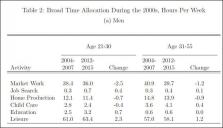
 sample812.jpg620 x 356 - 46K
sample812.jpg620 x 356 - 46K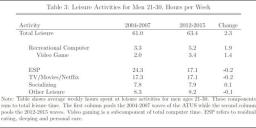
 sample813.jpg650 x 320 - 40K
sample813.jpg650 x 320 - 40K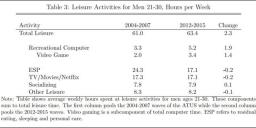
 sample814.jpg650 x 320 - 42K
sample814.jpg650 x 320 - 42K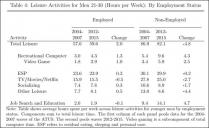
 sample815.jpg650 x 398 - 56K
sample815.jpg650 x 398 - 56K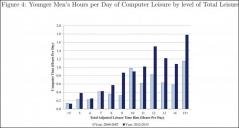
 sample816.jpg650 x 348 - 32K
sample816.jpg650 x 348 - 32K -
Charts from article mentioned in other topic
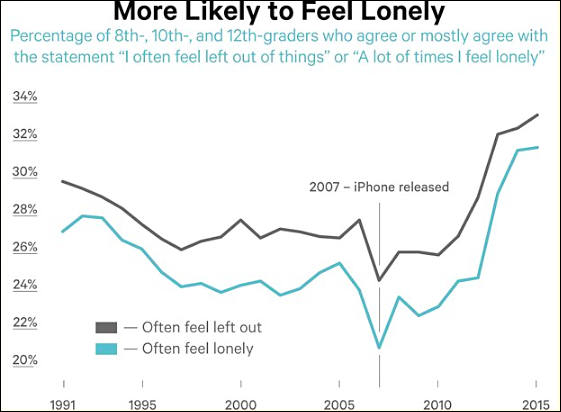
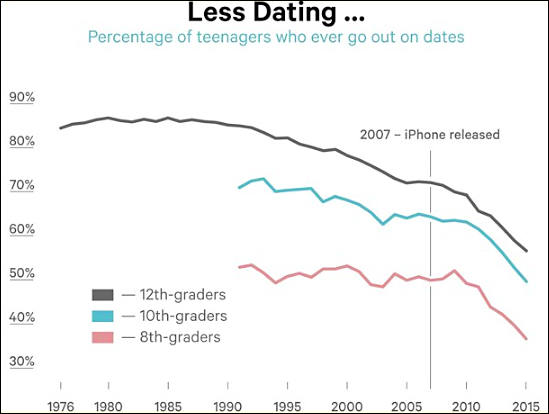
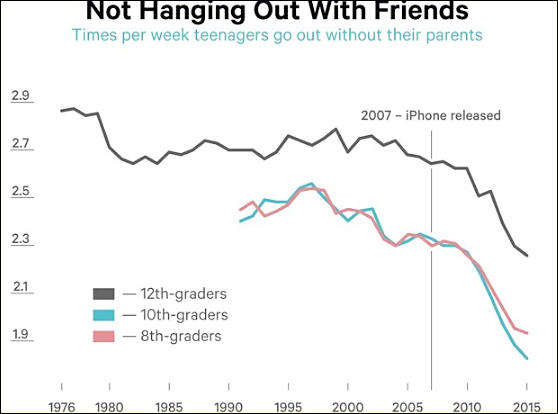
https://www.personal-view.com/talks/discussion/17461/smartphone-destroyed-a-generation

 s405.jpg561 x 412 - 31K
s405.jpg561 x 412 - 31K
 s406.jpg549 x 414 - 26K
s406.jpg549 x 414 - 26K
 s407.jpg558 x 414 - 27K
s407.jpg558 x 414 - 27K -
Bad for sex also
David Spiegelhalter from the Cambridge university has warned about negative impact television and web series on sexual life of couples. According to him, in 1990 couples had sex on average five times a month, and now — only three times that speaks about decrease in sexual activity by 40 percent in only 20 years. If the tendency remains, the scientist says, then by 2030 sex will disappear from life of the British
-
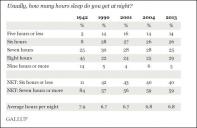
 s1271.jpg509 x 331 - 25K
s1271.jpg509 x 331 - 25K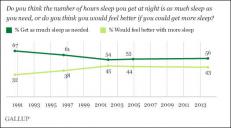
 s1272.jpg525 x 291 - 26K
s1272.jpg525 x 291 - 26K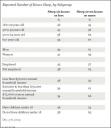
 s1273.jpg471 x 545 - 34K
s1273.jpg471 x 545 - 34K -
'Our minds can be hijacked': the tech insiders who fear a smartphone dystopia (via the Guardian)
[Rosenstein} was particularly aware of the allure of Facebook “likes”, which he describes as “bright dings of pseudo-pleasure” that can be as hollow as they are seductive. And Rosenstein should know: he was the Facebook engineer who created the “like” button in the first place. https://www.theguardian.com/technology/2017/oct/05/smartphone-addiction-silicon-valley-dystopia
Seems to be a small movement from within the tech world (although they are not the first people to question the advertisement driven model and the effects of being distracted. http://www.timewellspent.io/
-
Smartphone usage
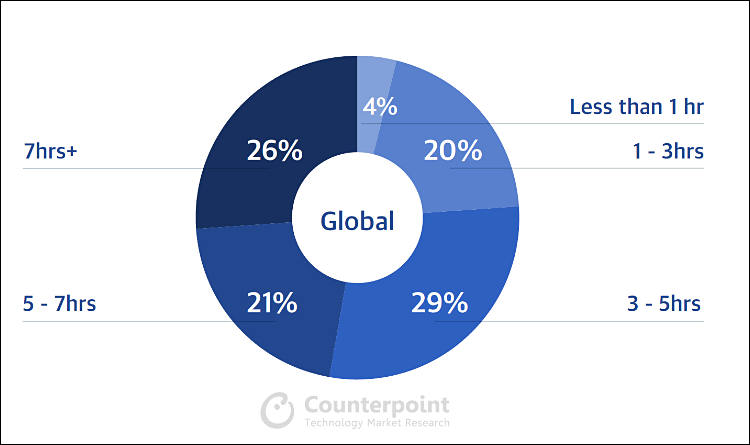
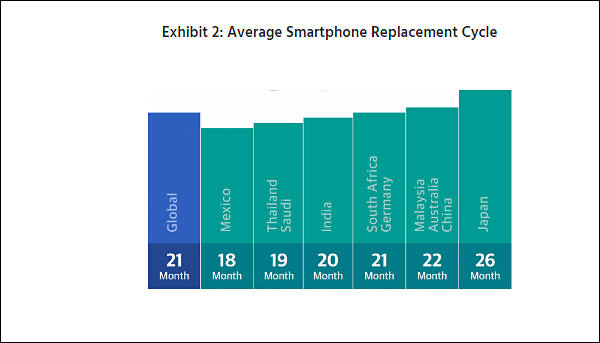
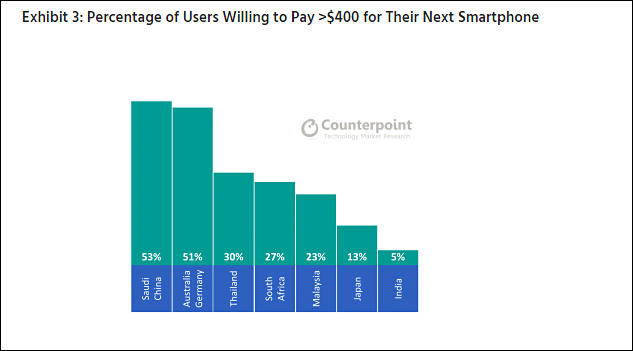

 s1388.jpg750 x 445 - 33K
s1388.jpg750 x 445 - 33K
 s1389.jpg600 x 343 - 27K
s1389.jpg600 x 343 - 27K
 s1390.jpg633 x 351 - 25K
s1390.jpg633 x 351 - 25K -
"I don't know if I really understood the consequences of what I was saying, because [of] the unintended consequences of a network when it grows to a billion or 2 billion people and ... it literally changes your relationship with society, with each other ... It probably interferes with productivity in weird ways. God only knows what it's doing to our children's brains."
"The thought process that went into building these applications, Facebook being the first of them, ... was all about: 'How do we consume as much of your time and conscious attention as possible?'"
"And that means that we need to sort of give you a little dopamine hit every once in a while, because someone liked or commented on a photo or a post or whatever. And that's going to get you to contribute more content, and that's going to get you ... more likes and comments."
"It's a social-validation feedback loop ... exactly the kind of thing that a hacker like myself would come up with, because you're exploiting a vulnerability in human psychology."
-
Interesting publication on using notes on lectures
Taking notes on laptops rather than in longhand is increasingly common. Many researchers have suggested that laptop note taking is less effective than longhand note taking for learning. Prior studies have primarily focused on students capacity for multitasking and distraction when using laptops. The present research suggests that even when laptops are used solely to take notes, they may still be impairing learning because their use results in shallower processing. In three studies, we found that students who took notes on laptops performed worse on conceptual questions than students who took notes longhand. We show that whereas taking more notes can be beneficial, laptop note takers’ tendency to transcribe lectures verbatim rather than processing information and reframing it in their own words is detrimental to learning.
http://freakonomics.com/media/The%20Pen%20Is%20Mightier%20Than%20the%20Keyboard.pdf
Howdy, Stranger!
It looks like you're new here. If you want to get involved, click one of these buttons!
Categories
- Topics List23,992
- Blog5,725
- General and News1,354
- Hacks and Patches1,153
- ↳ Top Settings33
- ↳ Beginners256
- ↳ Archives402
- ↳ Hacks News and Development56
- Cameras2,367
- ↳ Panasonic995
- ↳ Canon118
- ↳ Sony156
- ↳ Nikon96
- ↳ Pentax and Samsung70
- ↳ Olympus and Fujifilm101
- ↳ Compacts and Camcorders300
- ↳ Smartphones for video97
- ↳ Pro Video Cameras191
- ↳ BlackMagic and other raw cameras116
- Skill1,960
- ↳ Business and distribution66
- ↳ Preparation, scripts and legal38
- ↳ Art149
- ↳ Import, Convert, Exporting291
- ↳ Editors191
- ↳ Effects and stunts115
- ↳ Color grading197
- ↳ Sound and Music280
- ↳ Lighting96
- ↳ Software and storage tips266
- Gear5,420
- ↳ Filters, Adapters, Matte boxes344
- ↳ Lenses1,582
- ↳ Follow focus and gears93
- ↳ Sound499
- ↳ Lighting gear314
- ↳ Camera movement230
- ↳ Gimbals and copters302
- ↳ Rigs and related stuff273
- ↳ Power solutions83
- ↳ Monitors and viewfinders340
- ↳ Tripods and fluid heads139
- ↳ Storage286
- ↳ Computers and studio gear560
- ↳ VR and 3D248
- Showcase1,859
- Marketplace2,834
- Offtopic1,320















